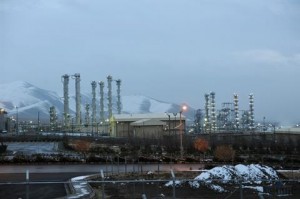 Few observers would question that news coverage prior to the 2003 U.S.- led invasion of Iraq affected public perceptions about the threat posed by weapons of mass destruction. Are news media making the same mistakes in covering Iran�s nuclear program? In short, yes and no.
Few observers would question that news coverage prior to the 2003 U.S.- led invasion of Iraq affected public perceptions about the threat posed by weapons of mass destruction. Are news media making the same mistakes in covering Iran�s nuclear program? In short, yes and no.Post-war studies of news coverage leading up to the Iraq War found an over-reliance on White House sources, the use of imprecise language to describe the threat from various types of weapons of mass destruction, a focus on the agenda and policy prescriptions of senior U.S. officials, and the news coverage�s relatively narrow framing of events.
In a review of six leading American and British newspapers� coverage of Iran�s nuclear program over the past four years, we found many of the same tendencies. Reporters and editors overwhelmingly relied on government officials to inform their reporting. As a result, officials� framing of the threat posed by Iran and of the policy choices they considered set the tone for coverage: Would sanctions force Iranian concessions or would military strikes be necessary to slow Iranian nuclear advances? Little attention was paid to policy alternatives proposed by others, including more sustained diplomacy or deterrence.
Newspaper coverage of Iranian nuclear intentions and capabilities also lacked precision, was inconsistent over time, and failed to provide adequate sourcing and context for claims. With a muddled understanding of the technical and political issues at the root of the dispute between Iran, the United States, European states (the so-called EU-3 � Britain, France, and German), and Israel, the discussion of policy options facilitated by the newspaper coverage was adrift and at times, misleading.
For example, when the U.N. Security Council debated an additional round of punitive economic sanctions against Iran in the first part of 2010, news coverage predominantly adopted the assumptions of U.S. and European officials that Iran�s nuclear behavior was sufficiently aberrant to warrant such a punitive response. A June 10, 2010 Washington Post article on the passage of the sanctions made no mention of what Iran did or didn�t do to warrant the additional sanctions, referring only to the �future of [Iran�s] nuclear program.� A June 9, 2010 New York Times article discussing the impending sanctions noted only that, �Despite the sanctions already in place, Iran is enriching uranium at ever-higher levels and building new centrifuges to create larger stockpiles.�
These limited references to Iran�s nuclear activities made no mention of the fact that Iran�s nuclear activities were under strict international monitoring, that they conformed to widely accepted nuclear nonproliferation requirements, and that national intelligence agencies differed in important ways in their estimates of Iranian nuclear capabilities and intentions. While the articles occasionally noted that Iran�s enrichment activities violated U.N. Security Council resolutions calling upon it to stop, they never mentioned concerns raised about the legality of these resolutions, including by Mohamed ElBaradei, the former Director General of the International Atomic Energy Agency (IAEA). Nor did they question the legality or morality of military strikes on Iran�s nuclear facilities, a policy option to which they gave extensive coverage.
Additional examples of the media�s failure to provide adequate context and detail abound in coverage of negotiations between Iran and the P5+1 (Britain, China, France, Russia, the United States, and Germany), of IAEA reports on Iranian nuclear advances, of the effect of punitive economic sanctions on Iranian behavior, and of the factors affecting U.S., Iranian, and European security strategies in the Middle East.
Reporters and editors sometimes did provide the necessary context and include voices from outside of official circles when examining events and the broader policy discussion. Some also took care to carefully parse estimates of Iranian capabilities and intentions. These, however, were the exceptions not the rule.
While these patterns in news coverage haven�t yet contributed to an ill-considered war against Iran, war is still one of the more likely outcomes of the international policy response to Iran�s nuclear program. This should not be the case, and news media have an important role to play to ensure the best policy outcome.
By examining the assumptions that they routinely make about Iranian intentions and capabilities, by exploring the security and domestic political context in which officials are operating, by consistently including a broad range of informed viewpoints about the possible outcomes, news media can ensure a more informed public discussion. Iran�s presidential election this spring and the current impasse in Iran-P5+1 talks are prime opportunities for reporters and editors to inject a deeper, more nuanced understanding of the security and political dynamics at play.
A robust and thorough public discussion about Iran�s nuclear program and the best possible outcome of the dispute for international security would not be guaranteed to influence official decision making, but not having this discussion certainly won�t help.
By Lobelog
The Iran Project is not responsible for the content of quoted articles.










